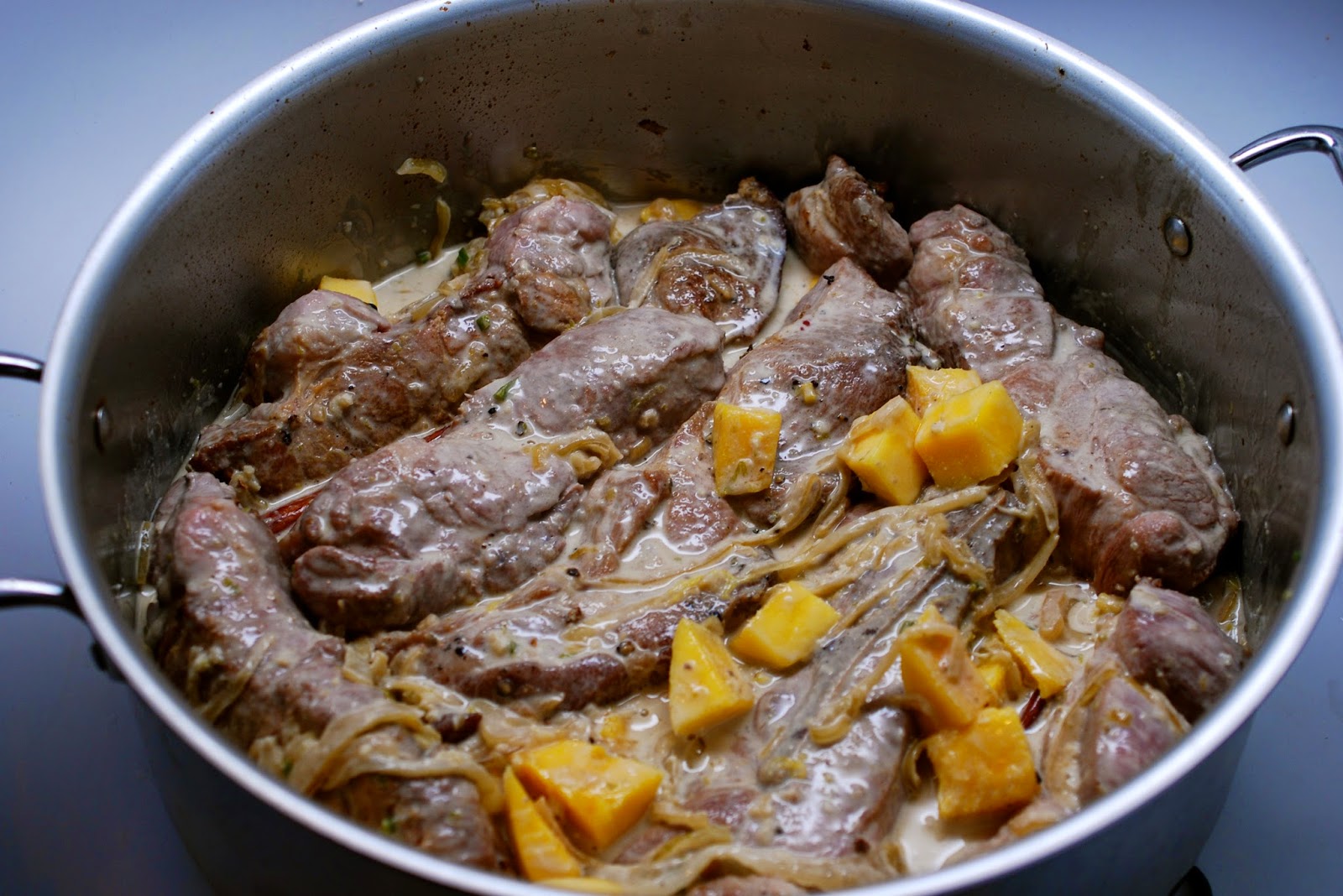For comments, please post below or
email to cookingwithlarue@gmail.com
Braised Country-Style
Pork Ribs with Mango & Lime
Serves: 4
Difficulty: Moderate
Mangoes are
the starting point for this wonderful recipe – add a bit of lime and a dash of
rum and we are out of February gloom and into a sunny mood. The additional
tropical flavors of lime, chilies, ginger and coconut milk only seem natural.
Take yourself to the Caribbean with this entrée. As the mango cooks, it gives itself up
entirely to the sauce, thickening it and contributing to a wonderful pale
orange color. Serve with some Jasmine rice cooked in broth, chopped onion and a
bit of coconut milk, add parsley for a bit of color and you have the perfect
addition to sop up the sauce.
Country-style
pork ribs are relative newcomers to the meat case, promote the shoulder-blade
section of the pork loin, and are not as lean as the pricier rib chops. Because
they have the tougher, fattier character of the pork shoulder, they are best
cooked slowly in any sort of braise. Shopping for them can be confusing, since
they appear in a variety of shapes arising from the top end of the loin or
bottom end of the shoulder. For this
recipe my favorites are cuts from the shoulder with bone in. They are never
symmetrical so look for an even mix.
- 2½ lbs bone-in country-style pork ribs
- Coarse salt and freshly ground black pepper
- 2 Tb olive or peanut oil
- 1-2 small cardamom pods
- 1 large ripe mango, (about 1 pound), flesh chopped into ½ inch dice
- 1 medium onion, thinly sliced (about 6-8 ounces)
- 2 large garlic cloves, minced
- 1½ tsp minced fresh ginger
- 1 serrano chile, minced
- One 2- to 3-inch cinnamon stick
- 1½ tsp grated lime zest
- 3 Tb golden or amber rum, such as Mount Gay (not dark)
- ½ C unsweetened coconut milk
- ¼ - ½ C freshly squeezed lime juice, to taste preference
- Lime wedges for serving, optional
To prepare
the cardamom: With your fingers or
the side of a large knife, split open the cardamom husks. Remove the dark,
grain-like seeds and discard the husks. In a mortar or a spice grinder, crush
the seeds to a fine powder. Set aside.
 |
| Cardamom seeds with the husk removed |
Pat the pork ribs dry with paper towels. Season
all over with salt and pepper. Heat oil in a large deep heavy lidded
skillet or braising pan over medium high heat until it shimmers. Add the pork
ribs, in batches so they aren’t crowded, and cook, turning once with tongs,
until they are browned and the fat is starting to crisp up, about 5 minutes per
side. Transfer the browned pork ribs to a platter and return skillet to medium
heat.
To the
skillet, add the onion and sauté,
stirring until soft, about 4 minutes. Add the garlic, ginger, serrano, cardamom, cinnamon, and lime zest, stir to
distribute them evenly, and sauté until fragrant, another minute or two. Pour
in the rum, stir to loosen any tasty
browned bits left from browning the pork, and simmer until there is almost no
liquid left about 1 minute. Add the coconut
milk, lime juice and mango and stir.
Settle the
pork ribs in the sauce, adding any juices that seeped out from the meat. Bring
to a simmer, cover tightly, and reduce heat to low. Simmer quietly, turning the
ribs once halfway through until the meat is fork-tender, about 1½ hours. Check
after 5-10 minutes, and if sauce seems to be simmering too vigorously, lower
the heat or place a diffuser beneath the pan. If, when you turn the ribs, you
notice the sauce is beginning to stick to the bottom of the pan, add ¼ C water.
Occasionally the sugar content of the mangoes will cause the sauce to stick.
 |
| Ribs now ready to simmer.... |
By the time the pork is ready, the sauce will have
cooked down and begin to caramelize around the edges of the skillet. Remove the
cinnamon stick.
My preference is to let it cool down at this point
and refrigerate overnight. This allows
me to skim the fat off the top before reheating the next day and proceeding. If
time does not allow, skim the surface to remove as much fat as you can. Once
fat has been removed, stir with a large wooden spoon so that the mango collapses
and thickens the sauce. Salt and pepper
to taste. Spoon the sauce over the ribs and serve to cheers. Really.
For additional country pork rib braise, see: Orange-soy
braised country pork ribs
Larue
Adapted from Molly
Stevens, All About Braising






No comments:
Post a Comment